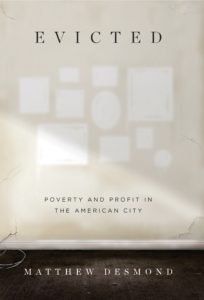“Evicted: Poverty and Profit in the American City” by Matthew Desmond
 I don’t usually read much nonfiction, but I was interested in Evicted because a few of the people I follow on LibraryThing wrote rave reviews of it on their threads. When it popped up on LibraryThing Early Reviewers, I requested it, and I was surprised to actually end up winning a copy. Also, in the time between reading it and writing a review, apparently it has won the Pulitzer prize for general nonfiction this year.
I don’t usually read much nonfiction, but I was interested in Evicted because a few of the people I follow on LibraryThing wrote rave reviews of it on their threads. When it popped up on LibraryThing Early Reviewers, I requested it, and I was surprised to actually end up winning a copy. Also, in the time between reading it and writing a review, apparently it has won the Pulitzer prize for general nonfiction this year.
Evicted follows eight families and their landlords in Milwaukee as they go through the eviction process. The families and the reasons they end up evicted are quite different, but we get a clear picture of their lives and how they ended up where they are. We feel their anxiety and hopelessness, and it’s very hard not to sympathize with them, even when they make impulsive decisions that seem like they’re going to make things worse.
I would say that this is the best nonfiction book I’ve read in a long time, perhaps all time. Most non-fiction books annoy me because they seem to have an idea that they’re pushing and pull in only the relevant facts, but Desmond presents events as they happen without too much commentary (he actually lived in two different low-income neighbourhoods for a year and most of the conversations recounted in the book are transcribed verbatim from audio recordings.) By focusing on the lives of both tenants and landlords, the book paints a balanced picture without moral judgment.
Desmond doesn’t just tell us individual stories, he also connects it to larger patterns and weaves in general research based on surveying over a thousand poor families. He makes a convincing case that evictions disrupt people’s lives extensively, making it much harder for them to escape poverty. He also shows how existing fair housing laws don’t always work as designed – for instance, landlords can evict tenants for causing a “nuisance”, which means calling the police too often. This means that in practice, women suffering domestic abuse often risk eviction by seeking help.
The book doesn’t spend a lot of time on solutions – there is a single chapter advocating a potential solution, but the main purpose is just to highlight the problem. I’m not sure what the answers are either, but I think more people need to read this book so we can have a conversation about it. I’m also looking for recommendations for similar books (in style and tone), so please comment if you know of any!
